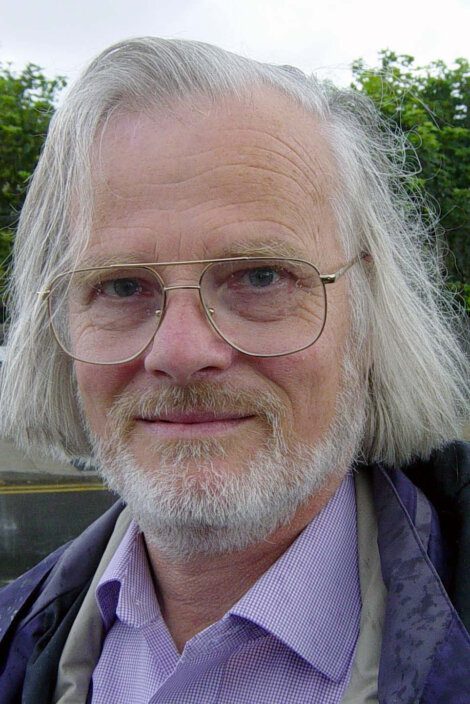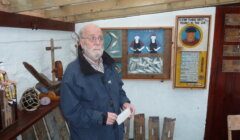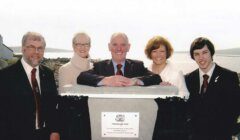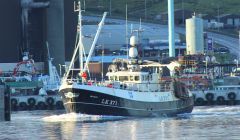Tributes / Obituary: Willie Thompson 1939-2023
Willie Thompson, 1939-2023
In 1962 Willie Thompson, with his wife Noreen Butler, and his close friend Douglas Bain, joined the Communist Party and the Young Communist League in Glasgow. They were all around 23 years old.
I remember hearing a Lerwick businessman fulminating about it. It wasn’t a normal event for young people in his world, especially young Shetlanders. He spluttered. Willie, who has just died, was born in Edinburgh in April 1939. His parents, Gilbert Thomas Thompson and Roberta Agnes Thompson, were from East Yell. Soon afterwards they went home.
When the war began Willie’s father joined the army, and the family moved to Lerwick. They sub-leased part of a council flat in the North Road. One more son was born, in 1943, adding to the cramped conditions. Roberta was ill with tuberculosis, and died later that year. Willie went to stay with relatives at Sandvoe in North Roe, one of the most isolated spots in Shetland.
He enjoyed his time there, and, young as he was, kept an eye on the little society and its foibles: see his article “Community conflict” in the New Shetlander in 2020.
After the war Thompson senior married again, and the family was reunited in Lerwick. Willie yearned for Sandvoe, but got down to work at the infant school. Two more children were born.
Things became more bearable in 1951, when they got a bigger council house. By that time Willie had passed the “Control” exam and was attending the Anderson Institute. That’s where he met Douglas Bain, his friend until Bain’s death in 2010. Douglas’s father, a cooper, was a Labour voter, and Douglas pressed Willie to join the Labour cause. He wasn’t successful at first. As late as the general election of 1955 Willie was hoping for a Tory victory.
Become a member of Shetland News
It seems to have been a reading of some Left Book Club volumes, acquired through Douglas, and Nasser’s nationalisation of the Suez Canal, that convinced him that he was a socialist. There had been revolutionary socialists in Lerwick before 1914, but by the 1950s that had changed. There were trade unionists in the town, but they weren’t very visible.
It wasn’t until Willie and Douglas went to Aberdeen University, in 1958, Willie to study history and Douglas psychology, that they found real opportunities for political action. They joined the University Labour Club, also called the Socialist Society, and Willie became chair of it. They dabbled with ideas of the New Left.
They eventually became members of the Labour Party Young Socialists, and campaigned along with members of International Socialism. They didn’t forget Shetland. They sent letters to the Shetland Times about the publication of Lady Chatterley’s Lover, which had caused consternation among Shetland’s clergymen. They opposed an attempt to set up a volunteer civil defence organisation.
In 1961 Willie contributed an article to the New Shetlander, “Shetland – an assessment”. It was a smashing piece, aimed at what he saw as Shetland’s parlous economic state and culture. Shetland literature, he said, was “a degenerate sentimental mush about which the less said the better”.
Shetlanders, he said, had “an ingrown outlook, a contemplation of the navel and a killing apathy and indifference towards larger issues.” The article provoked much debate.
Willie and his comrades graduated in 1962, and headed for Glasgow, which they regarded as the proletarian heart of Scotland. As I have said, they joined the Communist Party. Why? “We could not take seriously”, Willie wrote later, “the International Socialists’ notion of ‘Neither Washington nor Moscow’ – we had reached the view that one had to choose. “At the time we joined,” he went on, “the CP was repairing – numerically at least – the drastic loss in membership it had suffered in the crisis of 1956-57. “In our conception we were not enrolling in a weak and insignificant British political party but the UK section of an international movement which was embarked on the route to the socialist future and with the additional merit of holding political power in over a dozen states comprising a third of the world – and apparently proceeding from strength to strength.”
I needn’t say that these claims about the USSR were controversial, and still are. But Willie held on to them for the rest of his life. He taught in Glasgow schools for a few years. In the late sixties he embarked on a Ph.D. at Strathclyde on “Glasgow and Africa, connexions and attitudes, 1870-1900”.
I remember John Graham marvelling about the hundreds of books that Willie got through. Soon afterwards he secured an assistant lectureship at Wigan Technical College. He edited a journal there called Wigan Red. In August 1971 he applied successfully to teach history at the new Glasgow College of Technology.
He taught there for 20 years, eventually as professor of Contemporary History. He became an editor of and contributor to socialist publications. He edited the Scottish Marxist from 1972-80, and was a (young) editor of the Scottish Pensioner from 1978-82. In the late eighties he was the Scottish committee member on the editorial board of Marxism Today. That pointed to a gradual alteration in his political views: Marxism Today was the British organ of Eurocommunism, where (as Willie himself remarked later) bourgeois-intellectual more than proletarian views found a platform.
In 1991 the Communist Party of Great Britain disbanded. Willie voted for that outcome, “but was grieved that there was by then no meaningful alternative and regretted that the USSR and the Soviet bloc collapsed instead of being reformed ….” It was wishful thinking. He began to write books in earnest. His Good Old Cause, a short history of the Communist Party of Great Britain, appeared in 1992. It was the subject of a scathing review by the Trotskyist Al Richardson, in the journal Revolutionary History.
I’m afraid that Willie had drawn a veil over some of Stalin’s enormities, and the behaviour of his British sycophants. He was ever-loyal to the allegiance he had made in 1962. Other works were less controversial. Some of them are Postmodernism and History (1994) and Ideologies in the Age of Extremes (2010). In 2011 he collaborated with a friend in Out of the Burning House, political socialization in the Age of Affluence, about their experience at Aberdeen University.
His last book, Work, Sex and Power (2015) is a survey of every kind of exploitation, economic and ideological, from prehistory until the present. If you want to hear his voice, still with its Shetland twang after 57 years away, listen to an interview with him about it here.
I had friendly arguments with Willie over the years. We didn’t agree about the Soviet Union, and I wasn’t much taken with Eurocommunism either. But there was far more to Willie’s career than that. He never gave up on good socialist causes. And he didn’t abandon Shetland.
In 1991 he revisited his Shetland “assessment” of twenty years earlier. “It would grieve me enormously”, he said, “to lose the contact altogether; I dutifully read every issue of the Shetland Times and the New Shetlander (and occasionally even Shetland Life). … I’ve never ceased to maintain a love-hate relationship with these islands”.
Brian Smith
Become a member of Shetland News
Shetland News is asking its many readers to consider paying for membership to get additional features and services: -
- Remove non-local ads;
- Bookmark posts to read later;
- Exclusive curated weekly newsletter;
- Hide membership messages;
- Comments open for discussion.
If you appreciate what we do and feel strongly about impartial local journalism, then please become a member of Shetland News by either making a single payment, or setting up a monthly, quarterly or yearly subscription.













































































